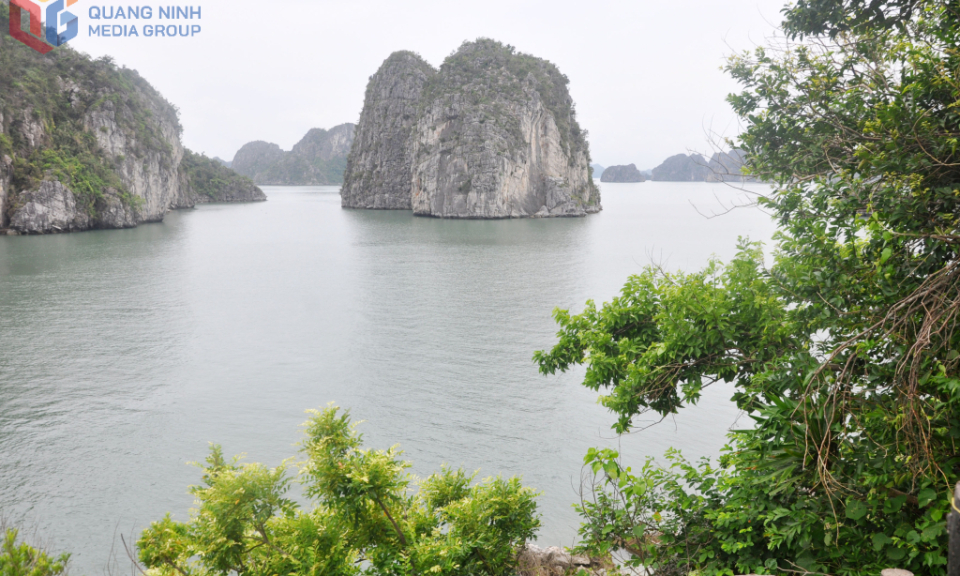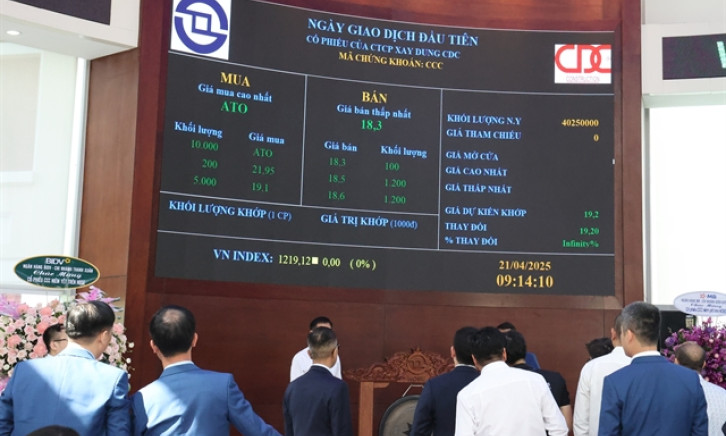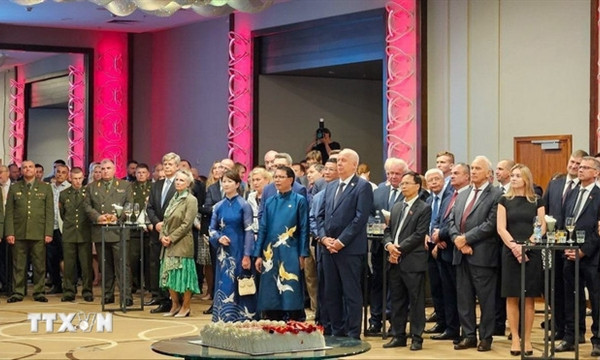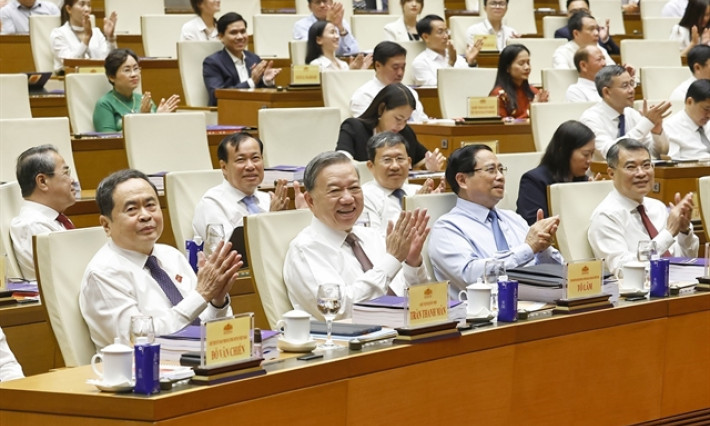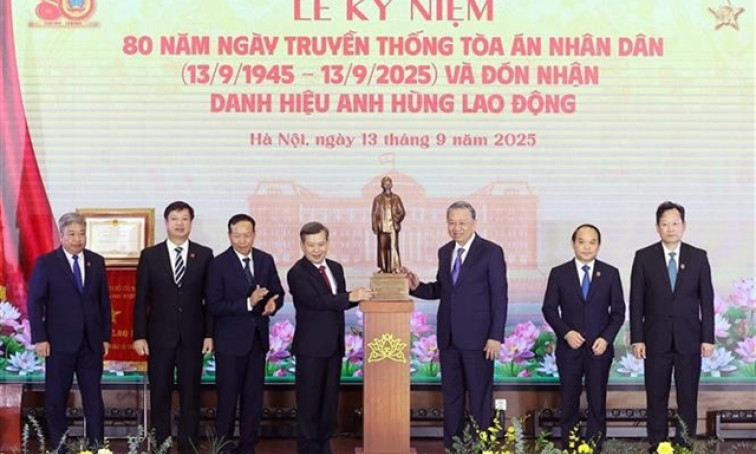President calls for new chapter in Việt Nam–Arab relations
President Lương Cường said that Việt Nam and Arab nations have great potential to boost cooperation, particularly in solar and wind energy, green hydrogen production and energy storage technologies.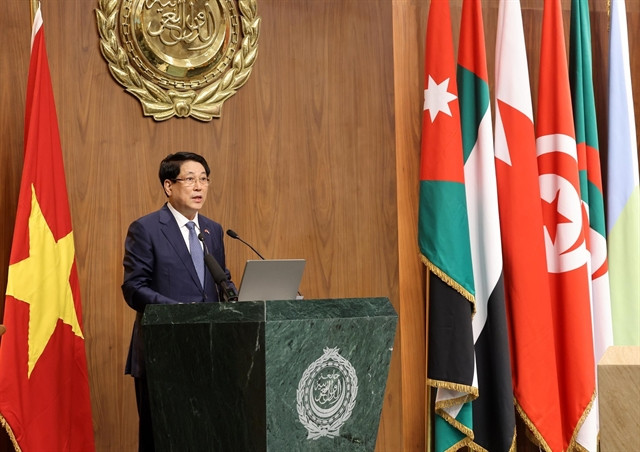
State President Lương Cường on Monday reaffirmed Việt Nam’s desire to open a new chapter in its multifaceted cooperation with Arab nations, aiming toward peace, partnership and sustainable development.
Speaking during a policy address at the headquarters of the Arab League in Cairo as part of his State visit to Egypt, President Cường emphasised that Việt Nam and Arab states have especially great potential to boost cooperation in solar and wind energy, green hydrogen production and energy storage technologies.
These promising sectors, he noted, can capitalise on the Arab world’s strengths in capital and technology and Việt Nam’s growing capacity in renewable energy.
The Vietnamese president was welcomed by Arab League Secretary-General Ahmed Aboul Gheit along with ambassadors and heads of missions representing member states. The two leaders also jointly presided over a ceremonial raising of Việt Nam's flag at the Arab League headquarters.
Founded in 1945 and based in Cairo, the Arab League is a regional intergovernmental organisation composed of 22 member states across North Africa, the Horn of Africa and the Arabian Peninsula, including key members such as Egypt, Saudi Arabia and the United Arab Emirates.
In July 2023, Việt Nam and the Arab League established a cooperation mechanism between Việt Nam’s Ministry of Foreign Affairs and the League’s General Secretariat.
During his speech, Cường said that amid the current complex global landscape, Việt Nam hoped all nations would uphold their responsibility to maintain world peace by promoting multilateralism, respecting the United Nations Charter, international law and universally recognised norms of conduct, while also honouring the legitimate interests of small and medium-sized countries.
He highlighted Việt Nam’s deep understanding of the value of peace, forged through decades of war and hardship, and expressed serious concern over the ongoing violence and prolonged humanitarian crisis in the Middle East.
The president expressed the hope that all parties involved would seek peaceful and sustainable solutions based on international law and dialogue to resolve the region’s conflicts and differences.
Reiterating Việt Nam’s consistent support for the Middle East peace process, he emphasised the country’s steadfast backing of the two-state solution in accordance with international law, the UN Charter and relevant UN resolutions.
Reflecting on Việt Nam’s historic achievements since launching its Đổi mới (Renewal) reforms nearly 40 years ago, President Cường attributed the country’s success to its focus on three core pillars: building a socialist democracy, developing a socialist rule-of-law state and fostering a socialist-oriented market economy.
Việt Nam, he said, was striving to meet two strategic goals: becoming a modern, upper-middle-income industrialised nation by 2030 and achieving developed, high-income status by 2045.
On foreign policy, Cường reiterated Việt Nam’s commitment to an independent, peaceful, self-reliant and proactive diplomacy that promotes multilateralism and diversification. Việt Nam would continue deep international integration and act as a responsible and constructive member of the global community, he said.
In the new era, Việt Nam would pursue comprehensive, modern and professional diplomacy to elevate its role and position in global politics, economics and culture.
The president also expressed pride in Việt Nam’s diplomatic relations with all 22 Arab League member states, underlining increasingly substantive and effective cooperation across various sectors.
To further strengthen ties, he proposed enhancing high-level delegation exchanges through both bilateral and multilateral channels, including regional and international forums.
He once again highlighted renewable energy as a particularly promising area, calling for deeper Việt Nam–Arab cooperation in solar, wind, green hydrogen and storage technologies.
In addition, the Vietnamese leader called on Arab governments to better support the over 30,000 Vietnamese workers currently employed in countries such as Saudi Arabia, Kuwait, Qatar and the UAE, enabling them to live and work stably and contribute more actively to both the host countries’ development and bilateral ties.
He also encouraged the expansion of cultural and artistic exchanges and scholarship programmes, particularly for Vietnamese students learning Arabic in the region.
Finally, Cường urged both sides to enhance coordination at regional and international multilateral forums, reinforcing their shared interests on the global stage.
Việt Nam had been making increasingly active contributions to addressing regional and global issues and stood ready to serve as a bridge to further promote cooperation between ASEAN and the Arab League, particularly in safeguarding peace and advancing the establishment of a just and equitable world order based on international law, where the voices and legitimate aspirations of developing countries are heard and respected, he said.

